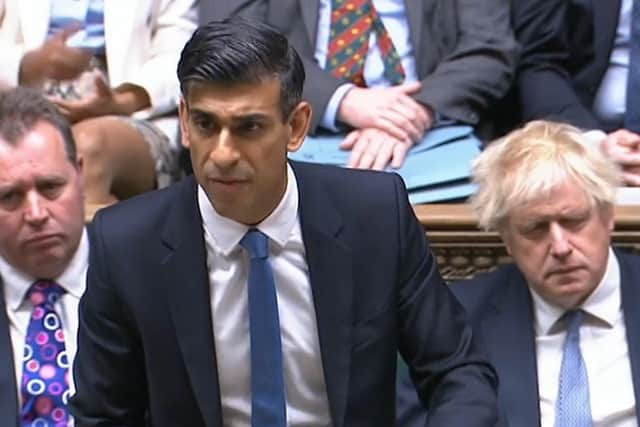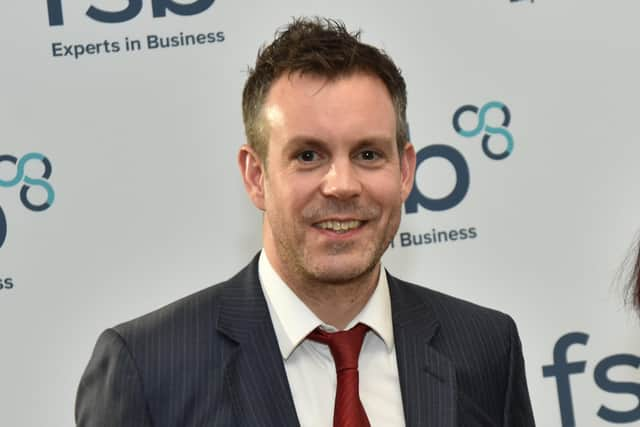Lancashire business leaders disappointed at lack of help from Chancellor in cost of doing business crisis
and live on Freeview channel 276
The Chancellor of the Exchequer announced a series of measures to help tackle cost of living increases, providing financial support to households, in particular the most vulnerable, with much of the funding coming from a windfall tax on the profits of oil and gas producers.
The announcements include a Temporary Energy Profits Levy of 25 per cent on profits oil and gas sector, support for those on lowest incomes via a £650 one-off Cost of Living Payment for those on means tested benefits, a one-off £300 Pensioner Cost of Living Payment. a £150 Disability Cost of Living Payment and a £500m increase and extension of Household Support Fund.
Advertisement
Hide AdAdvertisement
Hide AdHe also said that the Energy Bills Support Scheme will be doubled to a one-off £400 and available to everyone, whether a millionaire like himself or ordinary workers.


But this fuelled concerns that it would cause inflation to rise further which is already heading towards 10 per cent.
Steps were also taken to double the investment relief for oil and gas sector - “the more a company invests, the less tax they will pay”
In future years, if oil and gas prices return to historically more normal levels, the Government will phase out the Energy Profits Levy, and also the legislation will include a sunset clause, effective at the end of December 2025.


Advertisement
Hide AdAdvertisement
Hide AdMr Sunak said £5bn of the package would be paid for by a levy on the profits of oil and gas giants, and around £10bn will be covered by yet more UK borrowing.
Officials later conceded there was a hidden £6bn cost to the announcement, taking it to £21bn, because over the next five years the original £200 rebate for energy bills, which was announced in February and doubled and turned into a £400 grant by the Chancellor on Thursday, will no longer be paid back by consumers as originally planned.
But nothing was announced to help businesses also hit by rising prices for fuel and raw materials, prompting fears that they will have to pass on increased costs to customers and thus help to drive up inflation.
Geoff Mason, policy manager at the North and Western Lancashire Chamber of Commerce said: “The Chancellor has made these announcements following increased pressure to act. While many households will undoubtedly welcome the steps taken, businesses are left with no support.


Advertisement
Hide AdAdvertisement
Hide Ad“Businesses have been dealing with the same price increases as consumers such as energy and fuel, while also dealing with huge increases in raw materials, transportation, and wage inflation. There are also problems with supply chain disruption and recruitment difficulties.
“There is a need to support businesses through these extremely difficult times. We once again call for the government to consider the actions set out in the British Chambers of Commerce call for an Emergency Budget. A reversal of the increase in national insurance contributions and a reduction of VAT to 5 per cent on businesses’ energy bills would help ease some of the cost pressure faced by business.
“This would help reduce the need for businesses to raise their prices – leading to further inflation – and, in the case of the national insurance reversal would also keep money in the pockets of consumers.
“If businesses are to be the driver of growth to generate growth and the high-skilled, high-wage workforce promoted by the government, now is the time to support them so they can keep people in work while maintaining investment in innovation and skills.”


Advertisement
Hide AdAdvertisement
Hide AdBen Harrison, director of the Work Foundation at Lancaster University, a think tank for improving work in the UK, said the support was welcome but would not alleviate people’s sense of insecurity.
He said: “It’s welcome that the Chancellor has finally introduced new measures to help people through the cost of living crisis. The one-off payment of £650 to low income households is significant, and as it will be made via the benefits system it will land direct in the bank accounts of those who need it most.
“But the wait to provide this support has already caused significant damage, and delaying part of this payment to the Autumn risks compounding this.
"The UK Insecure Work Index shows that one in five (6.2 million) workers in the UK live in severe insecurity, unsure of how many hours they can work or much money they will earn. Making piecemeal announcements every few months only adds to the anxiety and uncertainty they face.”
Advertisement
Hide AdAdvertisement
Hide AdPaul Foster from the Federation of Small Businesses, which has its head office in Lancashire near Blackpool Airport, said: “There is no doubt alongside a cost of living crisis we now also have a cost of doing business crisis. The Chancellor missed an opportunity last week to keep business costs under control, which would have helped to keep prices down for the general public.
"Cuts to VAT and Fuel Duty and support through the business rates system would all have been measures which could have helped to relieve pressure on small businesses, we will continue to push for small businesses to be supported as there seems to be little likelihood of costs coming down in the immediate future.”


Hannah Essex, co-executive director of the BCC, said: “For business, the toxic mix of inflation, raw material costs and supply chain disruption is the flip-side of the coin to the problems facing consumers.
“Unless steps are also taken to ease business costs, they will likely feed into the inflationary pressure on the economy and quickly eat into the financial support announced today.
“The Treasury must urgently consider the actions set out in our call for an Emergency Budget which would provide a way to break the inflationary cycle.”
